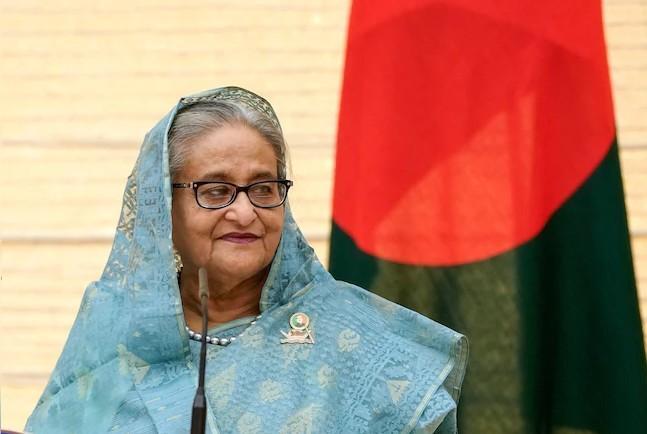
I don’t care about verdict, Allah gave life & he will take it: Sheikh Hasina
As the world waits with bated breath for the International Crimes Tribunal verdict on Monday, ousted former Bangladesh Prime Minister Sheikh Hasina has made a statement that reflects her unwavering faith and unshakeable resolve. When asked about the impending verdict, Hasina calmly replied, “Allah gave me life, Allah will take it…I’ve lost my parents, my siblings, and they burnt down my home.” These words, spoken with conviction and serenity, are a testament to the strong will and unrelenting spirit of the former Prime Minister.
Sheikh Hasina’s statement comes at a time when her son, Sajeeb Wazed, has expressed concerns about the possible outcome of the tribunal. Wazed has stated that the tribunal is likely to sentence his mother to death, a prospect that would have far-reaching consequences for Bangladesh and its people. Despite the uncertainty and danger that lies ahead, Hasina remains steadfast in her faith and conviction, refusing to be swayed by the fear of an adverse verdict.
For those who may not be familiar with the context, Sheikh Hasina is a prominent figure in Bangladeshi politics, having served as the country’s Prime Minister from 1996 to 2001 and again from 2009 to 2014. Her tenure was marked by significant economic growth, social development, and efforts to promote democracy and human rights. However, her opponents have accused her of corruption, nepotism, and authoritarianism, leading to her ouster from power.
The International Crimes Tribunal, established in 2010, is a domestic court set up to try those accused of committing war crimes, crimes against humanity, and other serious offenses during Bangladesh’s liberation war in 1971. The tribunal has been the subject of controversy, with some critics arguing that it is a tool for the ruling party to silence its opponents and consolidate power.
Sheikh Hasina’s case is one of the most high-profile ones to be heard by the tribunal, and the verdict is expected to have significant implications for Bangladesh’s politics and society. The former Prime Minister has been accused of various crimes, including corruption, murder, and human rights abuses, which she has consistently denied.
As the verdict approaches, tensions are running high in Bangladesh. Supporters of Sheikh Hasina have taken to the streets, demanding her release and protesting against the tribunal’s proceedings. The government, on the other hand, has deployed security forces to maintain order and prevent any unrest.
In this context, Sheikh Hasina’s statement is a powerful expression of her faith and resilience. By saying that she does not care about the verdict, she is, in effect, saying that she is prepared to face whatever comes her way, knowing that her life and fate are in the hands of a higher power. Her words are a testament to the strength and courage that have characterized her life and career, from her early days as a politician to her current status as a global leader.
As the world watches the developments in Bangladesh, it is clear that the verdict of the International Crimes Tribunal will have far-reaching consequences, not just for Sheikh Hasina, but for the entire country. The outcome will either pave the way for a new era of peace, stability, and prosperity or plunge Bangladesh into further turmoil and uncertainty.
In conclusion, Sheikh Hasina’s statement is a powerful reminder of the human spirit’s capacity for resilience and courage in the face of adversity. As the world waits for the verdict, we can only hope that justice will be served, and that the people of Bangladesh will be able to move forward, united and strong.




